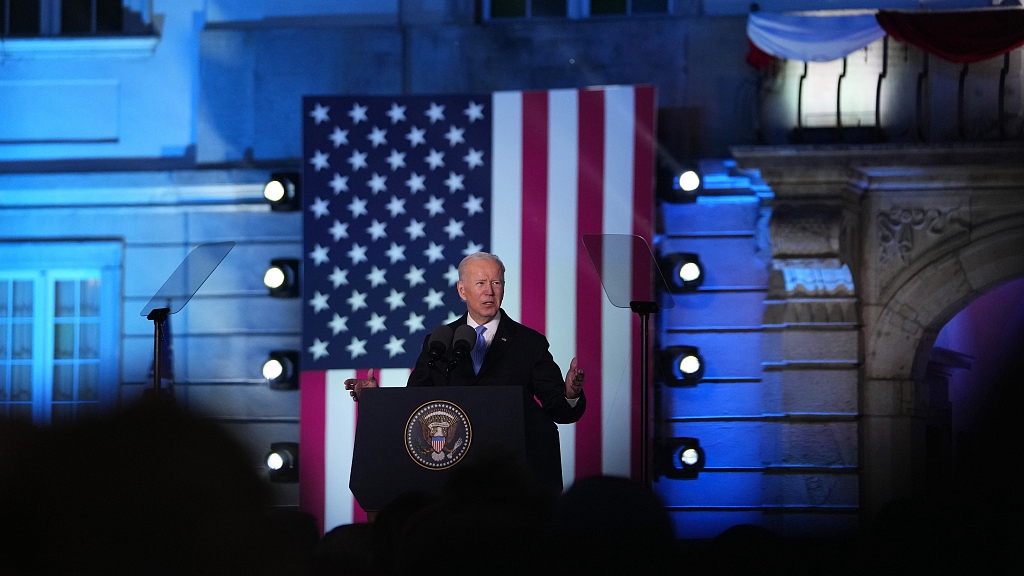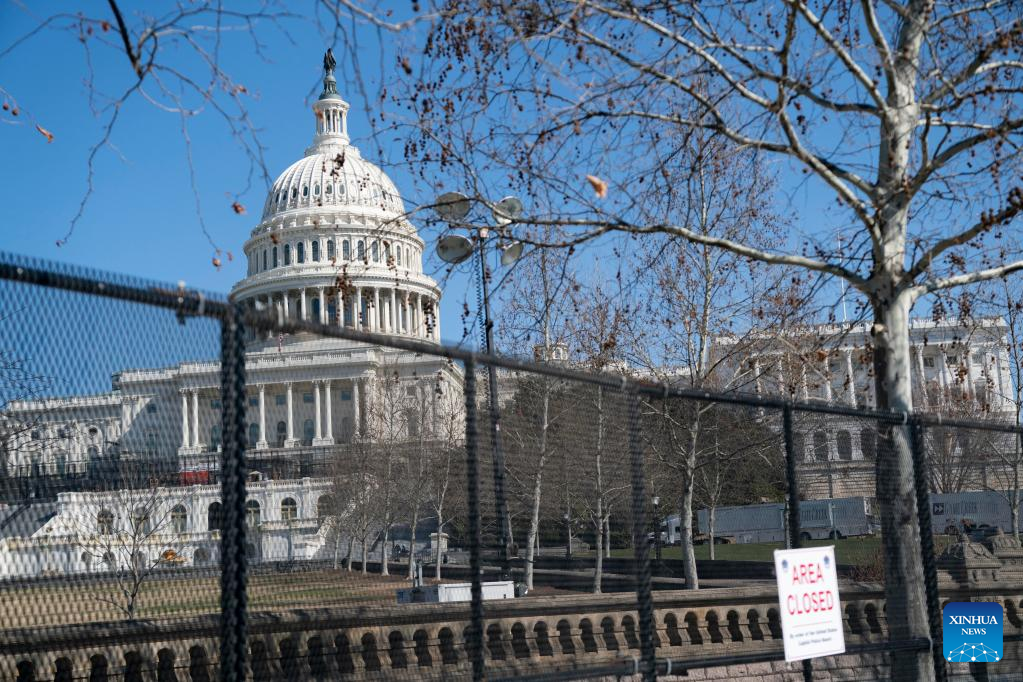
U.S. President Joe Biden delivers a speech at the Royal Castle in Warsaw, Poland, March 26, 2022. /CFP
U.S. President Joe Biden delivers a speech at the Royal Castle in Warsaw, Poland, March 26, 2022. /CFP
Editor's note: Stephen Ndegwa is a Nairobi-based communication expert, a lecturer-scholar at the United States International University-Africa and an author and international affairs columnist. The article reflects the author's opinions and not necessarily the views of CGTN.
The preposterous and vicious statement by United States President Joe Biden on March 26 in Poland that Russian President Vladimir Putin is a "butcher" who "cannot remain in power" has finally left no doubt about the covert operations of the superpower the world over. While he could have been playing to the gallery of its allies, the remarks have left no doubt of the suspicions of many that it is never up to no good in its interventionism.
Even as the U.S. administration's top officials, led by Secretary of State Antony Blinken, make frantic efforts to backtrack on the statement by spinning its meaning, no one is fooled about the veracity of the words in as far as U.S.'s foreign modus operandi is concerned.
On this one, there was no second-guessing Biden. In the heat of the moment, he poured his heart out and revealed what might have been discussed in the U.S.'s top defense machinery, including the Pentagon and the Central Intelligence Agency. It was also an incitement aimed at Putin's close allies or opportunists who might get ideas of forcibly removing Putin from power.
The unguarded remarks have made good fodder for Russia's supporters in the current Russia-Ukraine crisis. Russia and its close allies will obviously quote Biden by rightfully showing that Ukraine's attack was justified. The remarks prove that NATO's eastward encroachment was diabolical in its designs.
Though unprecedented, this was not a knee-jerk reaction from Biden. It is a stratagem that Ukraine's President Volodymyr Zelenskyy might have known about. Zelenskyy has been left holding the bag, as it were, after his allies unashamedly bolted from the ongoing conflict.
For decades, the U.S. regime machinations have been discussed within the scope of conspiracy theories. Experts have engaged in academic and political discourse to pin down the U.S. in specific cases that would leave no doubt of its involvement in the murder of presidents and heads of State, including coups d'etat and even economic sabotage.
Historical accounts reveal that the U.S. regime change policy started about seven decades ago after World War II. The consequent Cold War with the Soviet Union made the superpower paranoid as it aimed at controlling and "saving" the world from communism. Its footsteps are imprinted on many countries globally – particularly the non-aligned and those with a socialist bent – that have experienced changes in government either through enforced democracy or violence.

The U.S. Capitol building, seen through a barrier fence, in Washington, D.C., the United States, February 28, 2022. /Xinhua
The U.S. Capitol building, seen through a barrier fence, in Washington, D.C., the United States, February 28, 2022. /Xinhua
According to Dov H. Levin, a political scientist at the University of Hong Kong who was interviewed by USA Today, the U.S. performed at least 81 overt and covert known interventions in foreign elections between 1946 and 2000. Similarly, Lindsey A. O'Rourke said in his article "The Strategic Logic of Covert Regime Change: U.S.-Backed Regime Change Campaigns during the Cold War" that the U.S. engaged in 64 covert and six overt attempts at regime change during the Cold War.
After the end of the Cold War, the U.S. has pursued regime changes by supporting wars for selfish political and economic ends in the guise of intervention for peace restoration and fighting terrorism. Oil-rich Arab and Muslim-led countries have been major victims of these moves, as well as countries that complicate the U.S.'s geopolitical hegemony by refusing to play ball.
The U.S. obsession with regime changes falls under the gamut of its fixation with the concept of "absolute security." The superpower seems to have determined that its national security is threatened by a plethora of nations and ne'er-do-wells constantly seeking its destruction. Consequently, it has spent trillions of dollars to sustain its military-industrial complex as a means of protection and survival. The country has also spent billions of dollars on hundreds of peacekeeping missions globally involving thousands of its troops.
To achieve its objective of manipulating other countries, the U.S. has perfected the art of spying, proxy wars and major military invasions. But it has occasionally paid a high price in several instances, particularly in the steep human cost of its military personnel. Experts also note that regime change attempts exacerbate civil war, human rights violations and regional instability.
The effect of all this U.S. meddling is that it will actually put the country in the same situation it so desperately seeks to avoid. Worse, it will increase the magnitude of resentment from all those it has messed with, placing it at a higher risk of retaliation.
As Ben Denison at the CATO Institute wrote on January 6, 2020, regime change attempts "are likely to spark civil wars, lead to lower levels of democracy, increase repression, and in the end, draw the foreign intervener into lengthy nation‐building projects."
Ultimately, the U.S. needs to adopt a hands-off policy in the internal affairs of other countries, both for its sake and that of global peace and security. It should focus more on fixing its internal contradictions and solving its domestic problems rather than seeking scapegoats to cover up its insurmountable challenges.
(If you want to contribute and have specific expertise, please contact us at opinions@cgtn.com. Follow @thouse_opinions on Twitter to discover the latest commentaries in the CGTN Opinion Section.)

